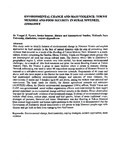Please use this identifier to cite or link to this item:
https://cris.library.msu.ac.zw//handle/11408/1074Full metadata record
| DC Field | Value | Language |
|---|---|---|
| dc.contributor.author | Nyawo, Vongai Z. | - |
| dc.date.accessioned | 2016-04-27T08:37:49Z | - |
| dc.date.available | 2016-04-27T08:37:49Z | - |
| dc.date.issued | 2015-05-19 | - |
| dc.identifier.issn | 2160-6579 | - |
| dc.identifier.uri | http://hdl.handle.net/11408/1074 | - |
| dc.description.abstract | This study seeks to identify features of environmental change in Mwenezi District and explore approaches to food security in the face of natural disasters with the aim of unmasking mass violence that occurred as a result of the flooding of Tokwe Mukorsi Dam. Mwenezi is a multicultural district comprising the Nambia, Shona, Ndebele, Venda and Shangani ethnic groups who are intermingled yet each has strong cultural traits. The District, which falls in Zimbabwe’s geographical region 5, which receives very little rainfall, has faced numerous environmental challenges. As a result of little food resources and given the recent flooding disaster at Tokwe Mukorsi Dam, the District is prone to mass violence where it comes to resource sharing. Network referencing was used to select 40 respondents among members of Mwenezi District to respond to a self-administered questionnaire interview schedule. Respondents of 40 years and above, and who have stayed in the District for more than 30 years were considered credible and had experienced sufficient environmental changes and episodes of mass violence. Six interviewees (3 males and 3 females) aged 60 and above, among the victims were selected and interviewed. The kraal heads (or chiefs), the district agricultural research and extension (AGRITEX) officer, the District environmental management (EMA) officer, World Vision and CARE non-governmental social welfare organisation officers were interviewed for their expert ground experience on environmental change and food security in the District. Direct observation was used to ‘ground truth’ evidence of environmental change. Evidence of environmental change include silted rivers, extinct plant, animal and bird species, failure of some traditional crops, shortages of pastures, firewood and water. Observation was that flooding at Tokwe Mukorsi Dam created huge scarcity and human rights problems in the district. It is recommended that the Government of Zimbabwe should demonstrate a will power to help Mwenezi people cope with disaster and get back on their lives managing their food issues. | en_US |
| dc.language.iso | en | en_US |
| dc.publisher | David Publishing Company | en_US |
| dc.relation.ispartofseries | Journalism and mass communication; | - |
| dc.subject | Environmental change, food insecurity, coping strategies, modem approaches, mass violence. | en_US |
| dc.title | Environmental change and mass violence: Tokwe Mukorsi and food security in rural Mwenezi, Zimbabwe | en_US |
| dc.type | Article | en_US |
| item.fulltext | With Fulltext | - |
| item.openairetype | Article | - |
| item.languageiso639-1 | en | - |
| item.cerifentitytype | Publications | - |
| item.grantfulltext | open | - |
| item.openairecristype | http://purl.org/coar/resource_type/c_18cf | - |
| Appears in Collections: | Research Papers | |
Files in This Item:
| File | Description | Size | Format | |
|---|---|---|---|---|
| Environmental change1.pdf | 2.36 MB | Adobe PDF |  View/Open |
Page view(s)
12
checked on Jul 26, 2024
Download(s)
12
checked on Jul 26, 2024
Google ScholarTM
Check
Items in MSUIR are protected by copyright, with all rights reserved, unless otherwise indicated.


